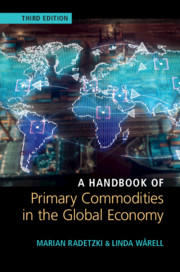Book contents
- A Handbook of Primary Commodities in the Global Economy
- A Handbook of Primary Commodities in the Global Economy
- Copyright page
- Contents
- Figures
- Tables
- Acknowledgments
- Introduction
- 1 The Historical Framework
- 2 The Geography of Commodity Production and Trade
- 3 Comparative Advantage and Trade Policy Distortions
- 4 Fossil Fuels
- 5 Price Formation and Price Trends in Commodities
- 6 Commodity Booms
- 7 Commodity Exchanges, Commodity Investments and Speculation
- 8 Sustainability and the Threats of Resource Depletion
- 9 Fears of and Measures to Assure Supply Security
- 10 Producer Cartels in International Commodity Markets
- 11 Public Ownership of Commodity Production
- 12 The Monoeconomies: Issues Raised by Heavy Dependence on Commodity Production and Exports
- References
- Index
Introduction
Published online by Cambridge University Press: 06 November 2020
- A Handbook of Primary Commodities in the Global Economy
- A Handbook of Primary Commodities in the Global Economy
- Copyright page
- Contents
- Figures
- Tables
- Acknowledgments
- Introduction
- 1 The Historical Framework
- 2 The Geography of Commodity Production and Trade
- 3 Comparative Advantage and Trade Policy Distortions
- 4 Fossil Fuels
- 5 Price Formation and Price Trends in Commodities
- 6 Commodity Booms
- 7 Commodity Exchanges, Commodity Investments and Speculation
- 8 Sustainability and the Threats of Resource Depletion
- 9 Fears of and Measures to Assure Supply Security
- 10 Producer Cartels in International Commodity Markets
- 11 Public Ownership of Commodity Production
- 12 The Monoeconomies: Issues Raised by Heavy Dependence on Commodity Production and Exports
- References
- Index
Summary
The antecedent to the present work is Marian Radetzki’s book A Guide to Primary Commodities in the World Economy, published by Blackwell in 1990, three decades ago. In that book Radetzki presented the gist of what he had learnt over the 30 preceding years of active study and research on international primary commodity markets. The timing of that publication was clearly inopportune. Though the book received positive reviews, it aroused only limited attention. Through the 1980s and 1990s, primary commodity markets were in the doldrums. Supply conditions for most commodities were quite relaxed most of the time, and prices remained suppressed. The advanced economies were in a process of dematerialization, where declining volumes of raw materials were needed per unit of value added. This suppressed demand growth and reduced the significance of commodities in their macroeconomies.
- Type
- Chapter
- Information
- Publisher: Cambridge University PressPrint publication year: 2020

